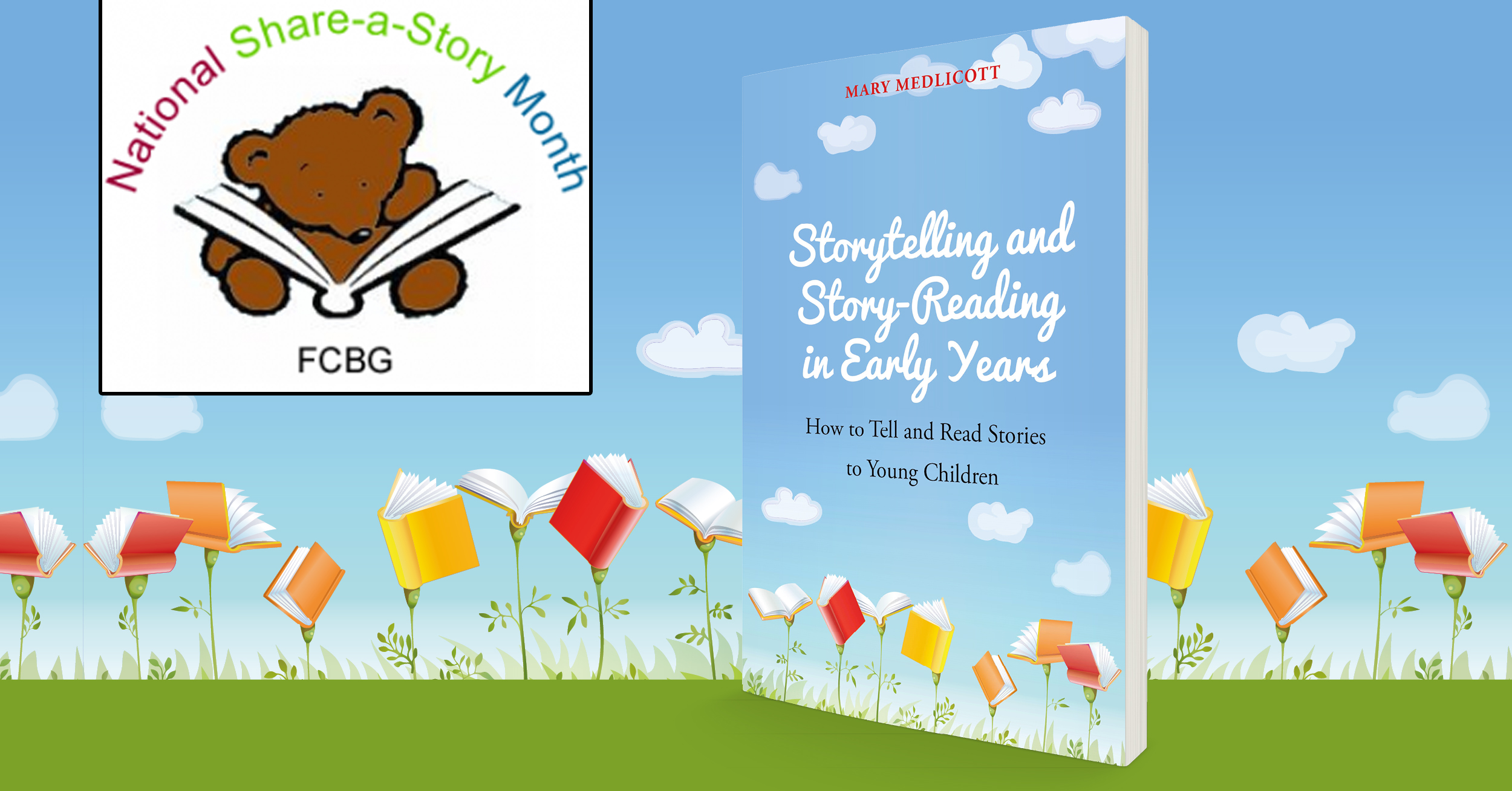Mary Medlicott, author of Storytelling and Story-Reading in Early Years, is a professional storyteller, storytelling trainer and storytelling workshop leader with over 30 years’ experience. Here she has written a topical piece for National Share-a-Story Month.
Here’s a story I once heard from a woman who’d been evacuated to somewhere in the country during the Second World War. Just a young girl at the time, she’d asked her evacuee-mother for a bed-time story. ‘A bed-time story?’ the woman mockingly replied. ‘I’ll tell you a bed-time story. It’s the story of The Three Wells. “Well, well, well!”’
What a horrible story! And very much NOT in the spirit of story-sharing. For as Grace Hallworth, a much-loved pioneer of the Storytelling Revival here in the UK has said, the telling of stories is ‘a shared activity, a communal act’. It can happen after a funeral or at a party or in your local pub. For what’s more fun than hearing all over again the tales about local people that by now have turned into legends? Just as enjoyably, it can be organised to happen in schools. For what’s more surprising than hearing twelve-year olds retelling stories about their area that none of their teachers previously knew because none of those teachers live in the area? Even those gruesome Mad Axeman stories so beloved by that age-group have their own kind of fascination.
Or stories can be shared more intimately, parent-to-child, child-to-parent, sitting on the sofa or in the family car. Towards the end of one parents’ storytelling course I was running, a young mother told me how grateful she was that she’d been attending. Till recently, evidently, her husband had never talked about his past either to her or the children. But now – and it felt so unexpected! – he’d begun telling them things. And his wife felt sure this welcome change had come about because, each week, she’d been going home and retelling the stories she’d heard on the course. Folktales, family stories, local legends, stories from other cultures: our course included them all. I believe in the power they all have.
But, alas, stories not shared can easily be lost. I once met a story-collector who would go over to Ireland once a year to hear stories from an old man who knew literally hundreds of them on every conceivable theme. One year as the collector was leaving, the old man said, ‘I’ve got a whole lot more I’d like to tell you. So if I’m no longer alive when you come next year, be sure to come up to the graveyard and I’ll tell them up to you.’ The next year – it’s inevitable isn’t it? – the story-collector learned when he arrived that the old man had died.
Making time for stories and bothering to tell them are such worthwhile things to do. So let me tell you a favourite story-sharing experience of mine that I’ve described it in my new book, Storytelling and Story-Reading in Early Years. It was a session with a Reception Class. As requested, animals were the theme of the stories I told and when these were done, I invited the children to pair up and share tales of any animals they’d encountered in their own lives. They were ebullient. No lack of story-sharing there. But it was as the children filed out for lunch that a quiet little boy came over, leaned towards me with a very serious expression and said, ‘My rabbit died.’ That’s all. But I felt that what he’d shared with me was a whole world of feeling and experience.
Of course, if you feel you haven’t got any stories of your own, you can always make one up or go off and find a book of tales from past times or other lands and retell one that you enjoyed. Short or long, funny or sad, stories like to travel and stories like to be remembered. To finish, here’s one of the shortest I know. It’s about a shepherd who lost a sheep. Aha! You may now be thinking, I know this one. Do you? After much searching, the shepherd found his sheep stuck in a deep puddle of mud. ‘Never mind,’ said the shepherd, ‘I’ll get her out.’ So he reached out his hands, took hold of her tail and pulled. Nothing doing. So he took off his coat, reached out his hands and pulled. No movement at all. So he spat on his hands and reached them out and he pulled and he pulled and he pulled. But then the sheep’s tale broke in two. Oh dear! For if that hadn’t happened, the tale I’m telling you now would have been a whole lot longer.
If you would like to read more articles like this and get the latest news and offers on our early years books, why not join our mailing list? We can send information by email or post as you prefer. You may also be interested in liking our Special Ed, PSHE and Early Years Resources Facebook page.
